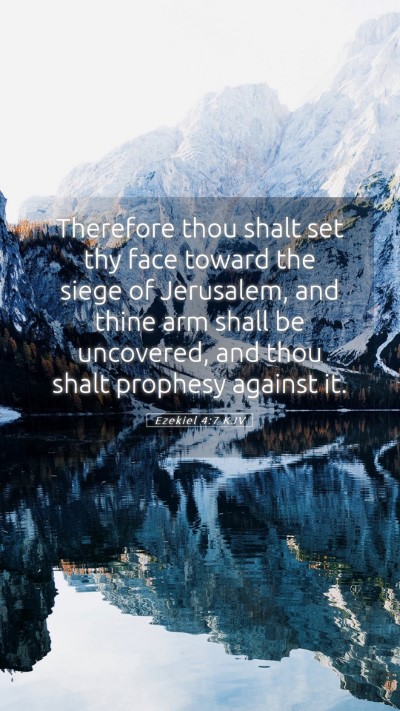Ezekiel 4:7 - Bible Verse Meaning and Commentary
Verse: Ezekiel 4:7
Summary: Ezekiel 4:7 presents a vivid command from God to the prophet Ezekiel, in which he is instructed to set his face against Jerusalem and prophesy against it. This act signifies a direct confrontation of the sins of Israel, emphasizing the impending judgment that will befall the city due to its disobedience.
Bible Verse Interpretations
This verse serves to illustrate several key themes essential to our Bible verse understanding:
- Divine Judgment: The command to prophesy against Jerusalem highlights God's holiness and justice in response to sin.
- Symbolism of the Prophet's Actions: Ezekiel's acts symbolize the seriousness of warning a sinful nation.
- The Role of the Prophet: It underlines the prophet's duty to convey God's messages, even when they are met with resistance.
Insights from Public Domain Commentaries
This section compiles insights from respected commentaries to deepen our Bible study insights.
Matthew Henry's Commentary
Matthew Henry notes that Ezekiel's actions serve both as a solitary testimony and as a public warning. The seriousness of his message illustrates the need for repentance among the people. Henry emphasizes that the prophet's position of facing Jerusalem signifies an unwavering commitment to portraying God’s perspective on sin.
Albert Barnes' Notes
Albert Barnes elaborates on the significance of Ezekiel setting his face against Jerusalem. He interprets this as a clear indication of God's displeasure and the certainty of impending doom. Barnes draws attention to the cultural context of prophecy in Israel, emphasizing that prophecies serve as calls to repentance aimed at restoring the people to faithfulness to God.
Adam Clarke's Commentary
Adam Clarke points out the importance of understanding the historical context of this prophecy. Clarke indicates that Ezekiel’s proclamation is a precursor to the Babylonian captivity and expresses God’s encouragement for his people to turn back to Him. The intensity of this act reflects the grave reality of their situation.
Understanding Scripture: Historical Context
The historical context of Ezekiel 4:7 is critical for meaningful Bible verse commentary. The nation of Israel was spiraling into moral decline and idolatry, leading to divine judgment. Understanding Israel’s historical sins provides clarity on why such a strong prophetic response was required.
Bible Study Applications
When exploring Bible study lessons, one can apply Ezekiel 4:7 by considering these personal applications:
- Reflect on Personal Accountability: As Ezekiel confronted the sins of Jerusalem, we should also evaluate our lives for areas needing repentance.
- Understand God’s Patience and Justice: This verse affirms that God gives warning before judgment, demonstrating His desire for reconciliation.
- The Power of Prophecy: Recognizing the weight of prophecy helps us appreciate the messages throughout Scripture and their relevance to our lives.
Additional Cross References
For enhanced understanding, consider these cross-references:
- Ezekiel 3:17-21: The role of the watchman and the responsibility to warn sinners.
- Jeremiah 1:17: God's command to Jeremiah to confront the apostasy of Israel.
- Amos 3:7: God reveals His plans to the prophets before executing them, signifying His justice.
In conclusion, Ezekiel 4:7 presents profound truths regarding the nature of God’s communication through prophets, the seriousness of sin, and the inevitable consequences when the call to repentance is ignored. Engaging deeply with this understanding enriches our Scripture analysis and encourages a proactive approach in our own spiritual journeys.


